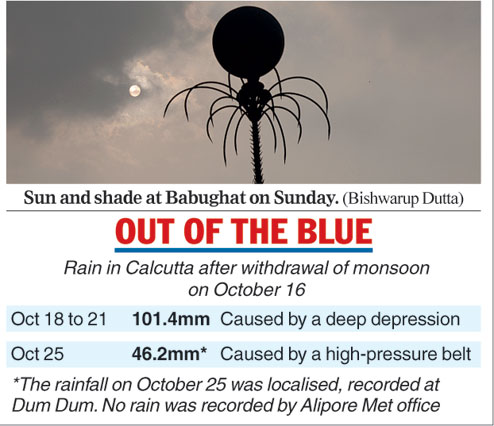
Jan. 11: Calcutta's demonetisation-hit real estate market suffered a notional revenue loss of Rs 500 crore in the last quarter of 2016 as sales slumped by 21 per cent compared to the corresponding quarters in the previous two years, says a research report.
The drastic last-quarter dip in sales didn't just spoil the real estate bottom line. The Mamata Banerjee government lost Rs 30 crore by way of stamp duty, based on a comparison of sales figures of the same quarter over three years. The report, compiled by international property consultancy Knight Frank, mentions that 3,413 units were sold between October and December last year, compared to an average of 4,331 units in 2014 and 2015.
Since the Knight Frank report usually considers only the top-grade developers, the impact of demonetisation could be more severe than the numbers suggest.
"This is a notional loss that the industry has suffered as buyers slammed the brakes on buying plans. While the cash squeeze is the principal reason for this, many prospective buyers have deferred their purchases in the hope that property prices and home loans would be cheaper," Samantak Das, chief economist and national director of Knight Frank, said.

The property consultancy's pre-demonetisation predictions have gone haywire. There was a 20 per cent dip in business in the second half of 2016, far higher than the 4 per cent that had been projected. Das said Knight Frank had desisted from predictions for 2017 considering several factors such as pace of remonetisation, introduction of real estate regulations, the Benami Transaction Act, GST and the trajectory of home loan interest.
Sushil Mohta, managing director of Merlin Projects and former president of the real estate body Credai, countered Knight Frank's assessment. "Home purchase is not an impulse decision. Apartments are not perishable commodities or dependent on daily revenue like hotel rooms or multiplexes. There is no loss to the industry as such. In fact, we are looking forward to a benign home loan regime," he said.
Mohta predicts that interest rates would settle at around 8.25 per cent, spurring real estate growth. "Our project cost has already come down by 1-1.5 per cent. We can pass on the benefit to customers," he said.
Das of Knight Frank said real estate had an intrinsic link with interest rates, recounting how a low-interest regime had driven sales at least twice in the past one-and-a-half decade. "When rates settled at around 8.25 per cent in the middle of 2009, sales zoomed by 51 per cent in 2010," he said.
In Calcutta, Rajarhat-New Town and south Calcutta drove both sales and new launches in 2016 and the trend would continue this year, states the Knight Frank report.
But the state government needs to boost the IT sector to maintain demand in Rajarhat-New Town, according to the consultancy.











